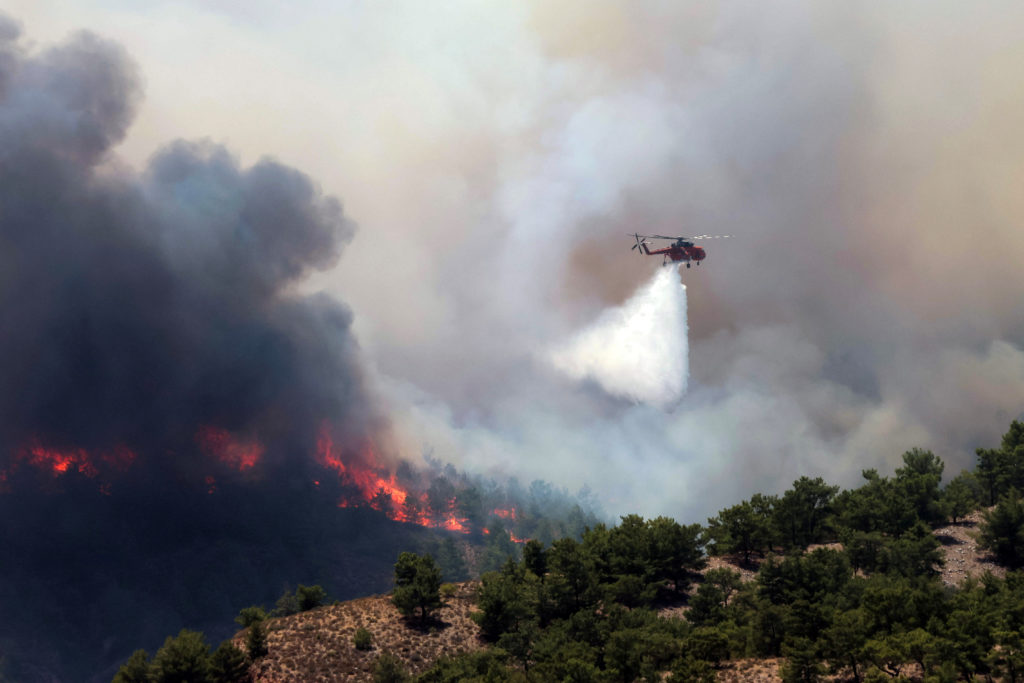Wildfires continue to burn in Greece, forcing more evacuations

RHODES, Greece (AP) — A weeklong wildfire on the Greek island of Rhodes tore past defenses Monday, forcing more evacuations, as three major fires raged elsewhere in the country fueled by strong winds and successive heat waves.
The latest evacuations were ordered in south Rhodes after 19,000 people, mostly tourists, were moved in buses and boats over the weekend out of the path of the fire that reached several coastal areas from nearby mountains.
“We are at war -– completely focused on the fires,” Prime Minister Kyriakos Mitsotakis said during a debate in parliament. “Over the coming days and weeks, we must remain on constant alert.”
READ MORE: Greece conducts country’s largest wildfire evacuation as island of Rhodes burns
Help continued to arrive from the European Union and elsewhere, with Turkish firefighting planes joining the effort in Rhodes, where eight water-dropping planes and 10 helicopters buzzed over flames up to five meters (16 feet) tall despite low visibility.
“The risk of fire will be extreme in several areas of Greece today,” Fire Service spokesperson Vassilis Vathrakogiannis said a day after temperatures on the southern Greek mainland soared as high as 45 degrees Celsius (113 degrees Fahrenheit).
Overnight, evacuations were also ordered on the western island of Corfu, where more than 2,000 people including tourists were moved to safety, on the island of Evia and in a mountainous area in the southern Peloponnese region.
European Commission President Ursula von der Leyen contacted Prime Minister Mitsotakis late Sunday to offer additional assistance.
“I called (Prime Minister) Mitsotakis to express our full support for Greece, which is confronted with devastating forest fires and a heavy heat wave due to climate change,” she wrote in a tweet.
On Rhodes, the fire roared down mountain slopes, burning homes and cars and leaving livestock dead on the roadside as they tried to escape.
Authorities said no serious injuries were reported in the evacuations, but hospitals and health volunteers provided first aid to tourists and others, mostly for the effects of heat and dehydration.
Officials from the Greek Foreign Ministry were working at the international airport with several embassies and diplomats who traveled from the U.K. to assist tourists who had lost their travel documents.
British tourist Kevin Evans was evacuated twice Saturday with his wife and three young children — first from Kiotari to Gennadi, and then as the fire approached to the island’s capital in the northeast, he told Britain’s PA news agency.
“There were lots of people in Gennadi sent from the hotels — many in just swimsuits having been told to leave everything in the hotel,” he told PA. “As night fell, we could see the fire on the top of the hills in Kiotari. They said all the hotels were on fire.”
READ MORE: Emergency heat measures in place as Southern Europe swelters
Several airlines, including easyJet and package operator Tui, sent planes to Rhodes to evacuate tourists forced from hotels by the wildfire. The U.K. government said between 7,000 and 10,000 British nationals are on the island, a popular package holiday destination.
Some tourists said travel companies had failed to provide information or help.
Rhodes is visited by about 2.5 million tourists each year and is one of Greece’s most popular holiday destinations. As some visitors continued to flee the island Monday, others were arriving from multiple European destinations to start their holidays at resorts not affected by the wildfire.
Greece is using a European Union satellite service to estimate the damage caused by the fire and to target resources. Photographs published online by the service showed a brown hourglass-shaped burn scar across the middle of the island.
The army was also helping to set up temporary accommodation on Rhodes, where schools and sporting facilities were opened to help with the effort.
A relative respite from the heat on Monday, with highs of 38 C (100 F) forecast, is to be followed by yet more high temperatures starting Tuesday.
However, it should get significantly cooler on Thursday, with temperatures in the low- to mid-30s Celsius, the country’s Meteorological Service said Sunday evening.
Gatopoulos reported from Athens. Jill Lawless in London and Monika Scislowska in Warsaw, Poland contributed.
ncG1vNJzZmivp6x7sa7SZ6arn1%2Bjsri%2Fx6isq2enpL%2BtsI6woKWclp6%2Fpr%2BMnKanrJmjwqZ506hkm62io3qquoygqZ6dk5p6p7vRnKCnn12ivLOxjJ6tmpullsGqu82s